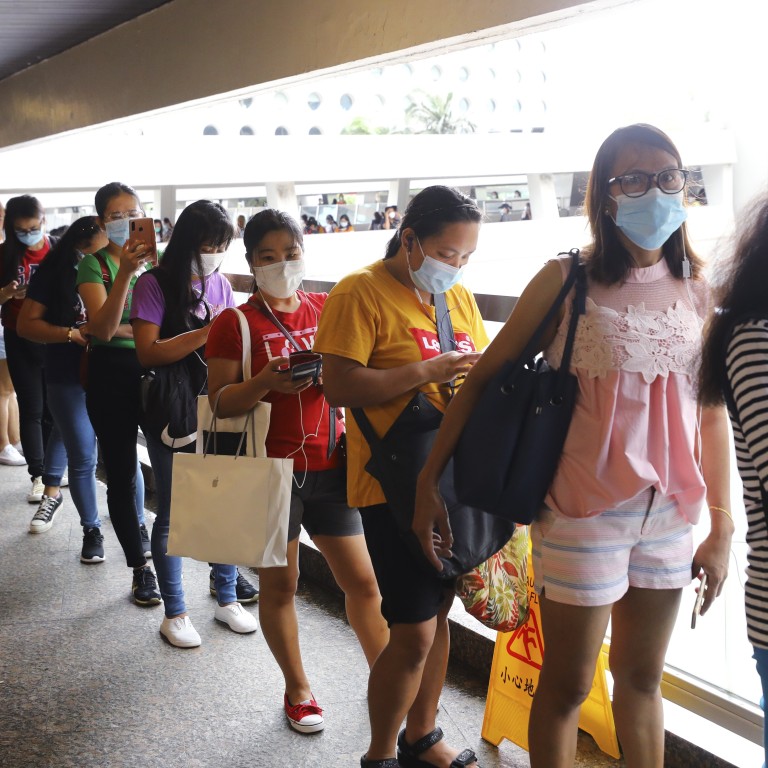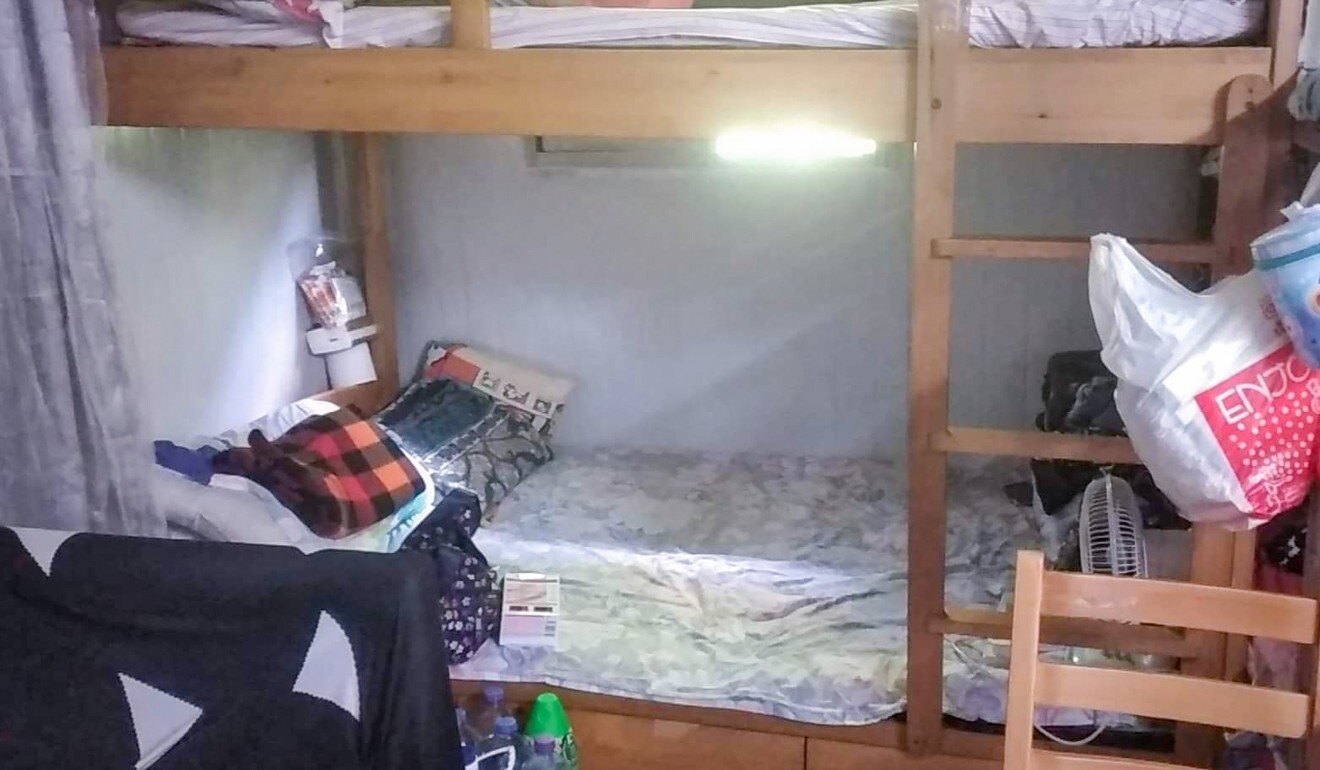
Coronavirus: crowded dorms putting domestic helpers at risk of infection, advocates say, as second worker confirmed positive
- Domestic helpers often have no choice but to stay in packed facilities when between jobs and while awaiting visas
- But the conditions create the possibility of outbreaks, workers’ rights groups say, as a second woman who stayed in one such dorm was confirmed to have contracted the coronavirus
Sringatin, a spokeswoman for the Asian Migrants Coordinating Body, said the Hong Kong government and countries that send domestic workers to the city were equally guilty of neglecting their responsibility to provide decent accommodation for domestic workers recruited by agencies.
She blamed the agents for being more concerned with profits than service.
“Stop depicting migrant domestic workers as Covid-19 spreaders,” she added, noting that the hundreds of thousands of migrant domestic workers in the city had been made scapegoats amid Hong Kong’s ongoing third wave of coronavirus infections.
Explainer | Are Hong Kong’s boarding houses for domestic workers hotbeds for Covid-19?
Sringatin, who, like many Indonesians, uses only one name, noted that the Immigration Department typically takes four to six weeks to approve visas for domestic workers, but may take as long as three months in some cases. During this time, domestic workers have to shoulder the cost of living in often-overcrowded boarding houses arranged by employment agencies.
Fears of a widespread outbreak surfaced this week after a job-seeking Indonesian domestic worker who tested positive for Covid-19 was found to have shared living spaces with at least 50 other workers at four locations. While none of the worker’s close contacts who had been tested as of Friday evening were found to be infected, health officials did confirm that a second Indonesian maid who had stayed at another worker dorm had also contracted the virus.
On Friday, Hong Kong recorded 89 new infections, bringing the city’s total number of confirmed cases to 3,938, with 46 related deaths.
Close contacts of infected helper test negative as Hong Kong sees 89 Covid-19 cases
Johannie Tong, community relations officer at Mission For Migrant Workers (MFMW) said poor living conditions at recruitment agency dorms had been a problem in Hong Kong for decades, and the issue was now magnified due to the Covid-19 pandemic.
Some domestic workers staying at such boarding houses told the Post on condition of anonymity on Friday that the crowded, ill-equipped dorms were the only places they could stay while looking for a new employer or waiting for their documents to be processed.
At Smart Team Employment Agency Center in Sha Tin, about 10 domestic workers waiting for contracts and visas were crammed into a small room, according to one helper currently staying there. Four people were sharing one bunk bed while others had to sleep on the sofa.
Filipino and Indonesian domestic workers living there had to pay HK$30 per day and the agency did not provide food.

At Overseas Employment Centre in Central, about 15 domestic workers were sharing the same room with foam mattresses on the floor, according to one Filipino worker. All of them also shared one bathroom and a communal dining area.
“We are scared of the new coronavirus outbreaks among domestic helpers in the dorms. But where else can we go? These are the only places we can stay at while finding a job,” the worker said.
The Filipino worker said she had worked in Hong Kong for 23 years, but was terminated a week ago and is waiting for a visa extension. Another domestic worker at the agency has been waiting for her visa for as long as four months, she added.
Smart Team Employment declined to comment on its boarding house facilities, while a staffer who answered the phone at Overseas Employment said they were not authorised to speak to the press.
Domestic workers staying at dormitories run by recruitment agencies may not have access to face masks either.
Hong Kong leader Carrie Lam calls for public support over free Covid-19 tests
A staffer who answered the phone at Jet System Pacific Limited, one agency accused of not providing workers with masks, said their dormitory in Wan Chai was at “full capacity,” but did not specify how many people were staying there. The staffer said the agency would start distributing masks on Saturday after being told by the Labour Department to supply the materials.
Meanwhile, some domestic workers had to rely on donations to access face masks amid the pandemic, according to Rain Tuando, 37, a Filipino domestic worker who has spent seven years in the city, and who helps distribute masks and sanitary supplies through a Facebook group called Domestic Workers Corner Hong Kong.
Meanwhile, amid the economic downturn and coronavirus pandemic, domestic workers are finding it increasingly difficult to find work if they are terminated by their employers.
Macau tightens entry requirements for arrivals from city as coronavirus cases surge
“The issue is that so many people who would normally employ domestic workers have themselves lost jobs, or are on reduced pay, making it difficult for them to afford full-time help,” said David Bishop, co-founder and director of Migrasia Global Solutions Ltd., a charitable incubator for solutions related to migrant worker issues.
On Thursday night, the government said it would provide free Covid-19 testing and masks to helpers living in boarding houses, but Tong, from MFMW, stressed that the government must provide free mass testing for all migrant domestic workers – not just those staying in agency dormitories. Many helpers, she noted, were still exposed to the coronavirus when shopping for their employers at supermarkets and wet markets.
Both respiratory medicine expert David Hui Shu-cheong and University of Hong Kong microbiologist Dr Ho Pak-leung said they believed the government had reacted quickly by providing free tests to more helpers who live in boarding houses, saying it was the right move.
Explainer | Should you be worried about Hong Kong’s wet market Covid-19 clusters?
“They are now a high-risk group ... as the boarding houses are often crowded with bunk beds, shared bathrooms and poor ventilation. Outbreaks could occur under such environments,” Hui told a radio programme on Friday.
But representatives from agent and helper groups raised concerns over the effectiveness of anti-virus measures in such crowded accommodation.
Shek Pui-yin, of the Hong Kong Federation of Asian Domestic Workers Union, told another radio programme that many helpers still opted for their agents’ accommodation as they only earn about HK$150 per day, making the usual boarding house fee of about HK$50 to HK$80 a day much more affordable than hotels.
She added that even testing would not put fears of an outbreak to rest if the government could not provide workers with other places of residence, or find another solution to their accommodation issues.
Meanwhile, the chairman of the Hong Kong Employment Agencies Association, Cheung Kit-man, suggested that the government should consider being more flexible in letting helpers move into the homes of their new employers while waiting for the Immigration Department to process their visas, rather than having them stay in agency accommodation.
Additional reporting by Chan Ho-him.

